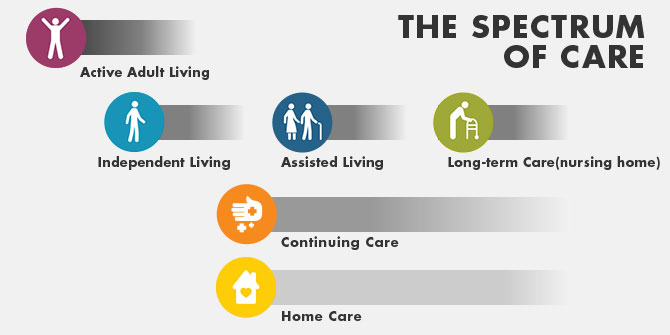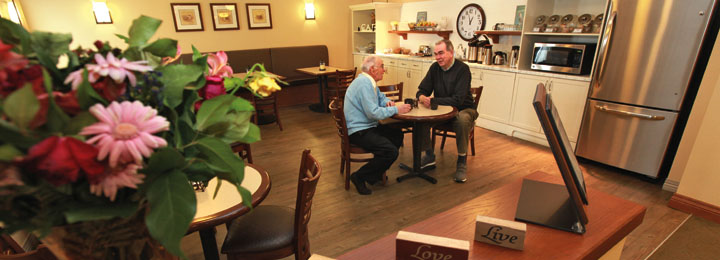Lists of reports on this page:
Find care details, insights, and insider perspectives gained from 20+ years of helping seniors and families.
What to know about this topic:
- Types of senior living with care in Kitchener
- How much do retirement home suites cost in Kitchener?
- Regarding senior living in Kitchener
- Medical services and safety
- Transportation for Kitchener seniors
- Choosing a Kitchener retirement community
- Retirement home regulations in Ontario
The city of Kitchener is situated in southern Ontario, 100 km west of the province’s capital, Toronto. The metropolitan area around the city known as the Region of Waterloo includes Kitchener and the smaller cities of Cambridge and Waterloo. Retirement homes in Kitchener have both assisted living and active senior apartments and the city offers affordable housing, as well as a variety of seniors’ services and plenty of recreational programs spread throughout the three cities.
This is your guide to finding the right senior community and care in the Kitchener region.
IN-DEPTH REPORTSRetirement communities in Kitchener
The Village of Winston Park
This elegant retirement residence in Kitchener-Waterloo offers a continuum of care from independent living apartments to assisted living, memory care and long-term care.
Lifestyle Options: Independent Living, Assisted Living, Memory Care, Long-term care
Types of senior living with care in Kitchener
Retirement residences and communities in Ontario can be broken into a few basic categories, the main ones being: independent living, assisted living, and long-term care (nursing homes). A full spectrum of care can be found in the Kitchener region, (see image below).

Independent and assisted living
Retirement homes in Kitchener will most often offer a continuum of care, where residents can transition from living unassisted in a community for the companionship and amenities to gradually receiving more care and support as needed. Choosing a retirement home in Kitchener with all three options allow residents to stay within the same community and support network as their needs change.
Long-term care
Seniors with more challenging health needs and can benefit from the more comprehensive care provided in long-term care. 24 hour care, secure facilities and special therapies available in residential care can help those struggling with illnesses and cognitive disabilities such as Alzheimer’s and Dementia. In long-term care, residents can feel safe in a familiar, secure and home-like environment and receive the personal care they need.
In reality, though, there are waiting lists for these communities. Families who are able to afford professional care should look at memory care in Kitchener area. The phrase "nursing homes," still used colloquially by some people, is no longer used in the long-term care industry.
How much do retirement home suites cost in Kitchener?
The monthly rent of a retirement home in Kitchener depends greatly on the type of suite and level of care you choose. To give you a rough idea of costs, however, the average monthly cost for a standard care unit in Ontario is $3,200.
Some of the most common ways of paying for retirement are through savings, pensions, Canadian Pension Plan (CPP) and Old Age Pension. The sale of the family home is also a good way to finance retirement costs.
The Ontario government can be helpful when it comes to additional expenses, such as home care or prescription expenses. Seniors with high prescription drug costs relative to their income may benefit from applying to the Trillium Drug Program. Seniors over the age of 65 who live in Ontario and have a valid Ontario health card are eligible for application.
Along with a host of retirement communities, Kitchener offers an affordable housing program for those seniors who want to remain in a home of their own.
Regarding senior living in Kitchener
Many seniors in Kitchener, Waterloo and Cambridge live alone, feeling like this is where they want to be, without really asking themselves whether this is best for them. Staying social is a vital part of remaining happy and healthy as you age. The city of Kitchener addresses this with programs such as “Bridging the Gap,” which eases the transition to retirement. There are also local adult day programs, as well as city-run programs hosted by local community centres. These are helpful, but they don’t necessarily holistically help seniors live well from day to day. Many, unfortunately, remain in homes they bought years before, suited to their younger selves. The neighbourhood, meanwhile, has become populated with people generations younger. They often eat alone, maintaining a home that’s too large, by themselves, having had friends move on or (sadly) pass away. No program truly addresses the array of issues arising from these factors.
A move into a senior living community like those listed above is life-changing in a way that few seniors ever imagine, thus giving rise to an oft-heard regret, “Why didn’t I do this earlier?” That was the question Lois asked after moving into a community listed above. She and her friend, Bill, serve as great examples of everything that makes moving into senior living worth it. Along with two others, they formed a special group of new friends in their community. They love the outings they take together, the freedom from mundane daily tasks, and the opportunity to rekindle passions (like Bill has for teaching) they’ve neglected in intervening years. We loved the story of their friendship so much, we follow up with them.
In a seniors’ community you form friendships not only with not only fellow community members, but with staff members, as seen in this story from another community listed above. In these communities, it’s not simply “senior living,” it’s living very well.
As a whole, retirement residences are social places with many recreational oportunities. Retirement homes often employ an activity consultant, responsible for organizing outings and recreational and leisure activities to keep residents active and social. For seniors who are looking to keep fit, retirement communities have facilities for all kinds of sport and fitness. Many have pools, as well as gyms and courts.

The city’s landscape also lends itself well to outdoor excursions. Kitchener’s parks and trails are also an excellent option for anyone who wants to explore nature or just get some fresh air.
The tri-city area around Kitchener is alive and well with arts, culture and celebration. The Waterloo region has many restaurants, and several libraries and shopping malls, and is home to no less than seven museums and historic sites and ten art galleries, many of which have free admission or special discounts for grandparents. Patrons of the theatre and music-lovers also have nine different theatre spaces and concert halls to visit. Seniors can explore these at their leisure, but retirement homes often make it easier to discover the city’s attractions by organizing nights out, shopping trips, and tours by accessible bus.
Kitchener, known sometimes as the “little Germany” of Ontario for its large German population, is also the site of many festivals from many different cultures – although Oktober Fest and the Christkindl Markt (Christmas market) still remain among some of the most popular. Some of the other favourites within the senior community include:
- Cruising on King Street (hundreds of classic cars on display)
- Kitchener Blues Festival
- KW Multicultural Festival
One of the unique events created for and by seniors in conjunction with the city is called “Salute to Seniors”. The event, started by the Mayor’s Advisory Council for Kitchener Seniors (MACKS) , is a way to recognize the contributions senior citizens have made and celebrate the positive presence of the older community. In addition to organizing the annual salute, MACKS, a 12 person council of senior volunteers, is also responsible for:
- Advising city staff and council on issues related to older adults
- Keeping strong links with provincial and national older-adult organizations
- Promoting a positive view of seniors
Residents of retirement homes have the opportunity to engage in celebrations and exercise their creativity both in the the community and within their residence. Art, dance and music classes, performances and concerts by volunteers, and residence parties all make modern retirement homes vibrant places to live.
Medical services and safety
Of Kitchener’s 204,000 residents, 25 percent are seniors, and this percentage is growing. Many of Kitchener’s seniors enjoy the benefits of living in a retirement residence – from the safe environment and day-to-day assistance to the social and community aspects. Most modern retirement homes provide their own health and wellness care, but also help to connect them to health care centres in the area.

Kitchener residents have access to all the essential services one would expect from a growing Canadian city. In addition to the care provided in residences there are also three local hospitals within the Kitchener-Waterloo area: The Grand River Hospital, St. Mary’s General Hospital, and Cambridge Memorial Hospital.
Although it’s good to know the nearest hospital is not too far away, today’s understanding of health care encompasses more than just emergency services. Active living, healthy eating, and staying safe are all part of a healthy lifestyle – especially for seniors – and Kitchener ‘s retirement homes provide a variety of services and programs that cater to all these branches of wellness.
Some examples of health and wellness services provided in independent and assisted living residences include:
- An on-site doctor, or a doctor who visits residents on a regular basis
- On-site nursing staff, often available 24/7
- An on-site pharmacy and medication assistance services
- Exercise programs with access to a personal trainer
- Physiotherapy
- Preventative wellness programs
- Recuperative programs
- Dietary and nutritional programs
- Assistance with daily living activities including bathing, dressing, nutrition and mobility
- Assistance with lifestyle maintenance including outings, social engagements and pet care
- Continence management programs
- Palliative and hospice care services
To ensure the meals served in retirement homes are both healthy and delicious, a dietician and/or trained chef are part of the staff team in assisted living and long-term care. Meals can be tailored to residents’ dietary and faith needs, and snacks are offered at some residences to help residents sleep better and regulate blood sugar.
One of the greatest advantages of living in a retirement residence is living in a safe environment. With resident safety as their first priority, most retirement suites are equipped with emergency-call systems, specially designed bathrooms with sit-down showers, non-slip floors and night-lighting. Long-term care homes with Alzheimer’s care and Dementia care also offer secure floors and 24/7 nursing.
Transportation for Kitchener seniors
Although there’s no shortage of things to keep busy with in Kitchener, getting around is often the largest hurdle for older adults to overcome. Retirement communities and the city both have options for those who no longer drive and are looking for public or private transportation anywhere – from health services to community festivals.
Some retirement residences have their own transportation and organize excursions, especially for residents with disabilities. Otherwise, public transit is always available to seniors. The city has a comprehensive public transit system that travels around the whole region of Waterloo, and offers reduced prices for seniors.
A city-funded MobilityPLUS service can help those with difficulty walking and boarding get around. Residents can register for MobilityPLUS to pick them up, but must book trips a couple days in advance. To make sure no seniors are left out due to limited mobility, the city also funds the seniors day initiative, which helps older adults with health and mobility problems participate in social activities by providing volunteer transportation and assistance.
The light rail transit (LRT) system in Kitchener is now scheduled to begin service in 2018. This should also make getting around KW easier for seniors, also.
Choosing a Kitchener retirement community
Finding the right retirement home for you or your loved one(s) is all about being prepared. Many seniors and their families wait until a time of crisis until they consider retirement homes. Starting your search during a difficult time can limit your options and increase stress. Whether you or your loved one(s) plans to live at home or is excited about moving into a retirement community, it is important to consider all your options.
How to Choose a Retirement Community from Comfort Life on Vimeo.
For more points to consider and some common questions and concerns about retirement homes, please visit our page for seniors considering a retirement home.
Before you begin your search, first ask yourself the following:
- What you want
- What you need
- What you can afford
- Your preferred location
Use our retirement calculator to get an idea of what you’ll be able to afford in your retirement.
The next step is looking for potential Kitchener retirement residences. Use our advanced search /find-communities to create a shortlist of communities that meet your wants and needs.
Asking questions is one of the most important parts of the process. If you are unsure about what questions to ask and what to look for on your visits, download our eBook on the ultimate retirement tour guide.
Remember to ask about overnight stays - some will let seniors stay overnight in a guest suite to get a better idea of what it’s like to live in the community. Choosing a retirement home can take time, but it doesn’t have to be stressful. Get started today by searching our website, or contacting the Kitchener residences below.
Retirement home regulations in Ontario
When it comes to safety within Kitchener’s retirement communities, every residence across Ontario is subject to the Retirement Home Regulatory Authority (RHRA). In order to remain operational, homes must receive approval from this authority and undertake ongoing inspections in order to ensure a standard of safety for retired residents.
When choosing a retirement home, always make sure to check the RHRA standing. Industry experts also recommend looking for a retirement community with membership in ORCA. Many retirement communities in Kitchener are members of the Ontario Retirement Communities Association, a voluntary association for retirement homes throughout the province.
In addition to accreditations and the regulations set by the RHRA, the Long-Term Care Homes Act, 2007 governs all long-term care homes in Ontario. The act requires residences to provide safe, consistent and high-quality resident-centred care and makes sure residents feel at home, are treated with dignity and respect, and have the health care services they need available to them.





